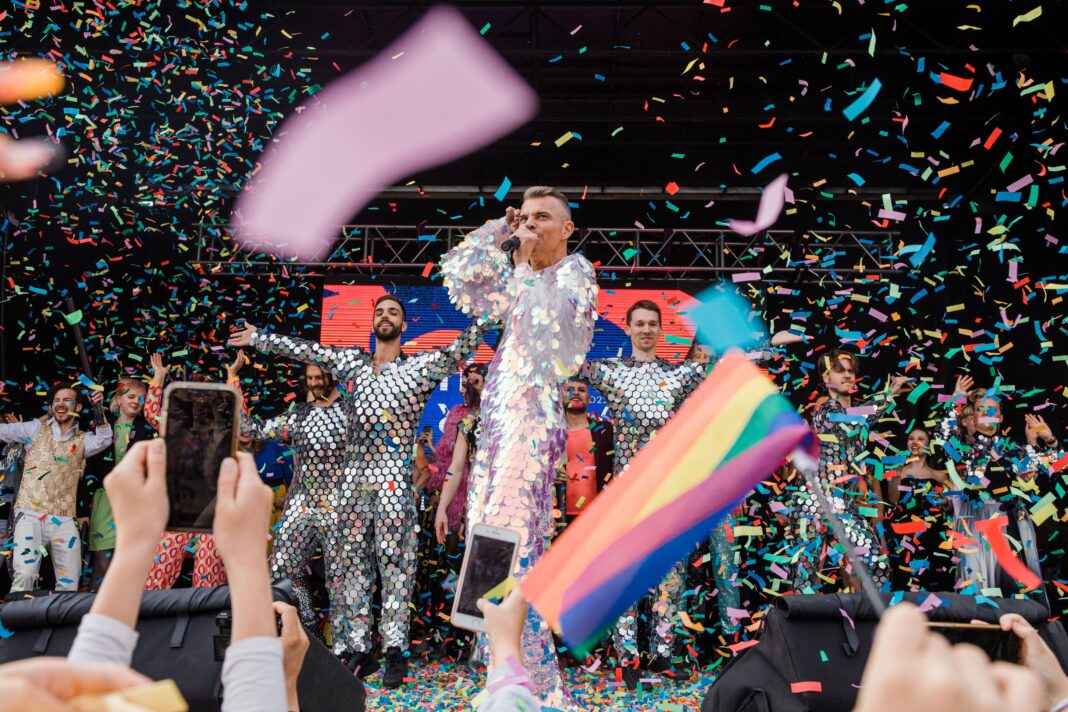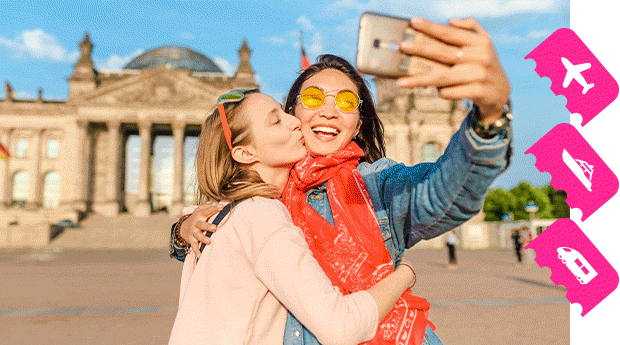With more puffins (about 10 million) than people (366,000), Iceland is not a destination for queer travellers looking for arena-style parties and endless nightlife choices. But with an estimated one-third of the nation showing up for annual Pride celebrations, including grannies and oodles of kids, the Nordic island is exceptionally LGBTQ2S+ friendly even if you don’t count the fact that it’s home to Björk.
The 2.2-million tourists expected to visit in 2023 certainly drive up the queer numbers. Of course, the chief draw is the landscape: mountains and lava fields, fjords and geothermal lagoons, the Northern Lights and the whale-welcoming seas. Though the price of food and accommodations can be steep, Icelandair’s stopover program—where a traveller can add a one- to seven-day Icelandic stop for free while on the way to another European or North American destination—makes this otherworldly, Instagrammable place a remarkably accessible add-on to a longer cross-Atlantic itinerary.
LGBTQ2S+ travellers who prefer quality over quantity will develop their own special affection for Iceland. The size of the place, particularly the capital Reykjavík, with a population of 130,000 (233,000 in the metro area), plays a part in this coziness. It’s relatively easy to meet and connect with locals (English is widely spoken) and visitors. Fall in love across the dancefloor on Friday, and you might easily run into the object of your attraction a few times in the course of a weekend; find someone on an app or hook-up site, and the chances are they’re less than a 20-minute walk away.
Reykjavík, for its size, is also ridiculously artsy and cosmopolitan: museums, art galleries, artisanal shops and the indie music scene (thanks again, Björk) all seem beamed in from another much larger city. Though H&M and sister chain COS have recently (and to some, shockingly) set up shop in a glitzy modern development near the harbour, the brands and businesses that a dedicated shopper, eater or drinker will mostly experience are distinctly Icelandic—and will come with built-in bragging rights. “Oh, this dainty multi-coloured bowl made of radish paper? I got it in Reykjavík.”
Above all, it’s the Icelandic character—egalitarian, inclusive, informal and irreverent—that’s key to the LGBTQ2S+ appeal. At a party during Reykjavík Pride in August, I noticed a group of especially glamorous people standing near the bar and sheepishly went up to them to ask, in English, who they were. Not only did they welcome me into their circle and introduce themselves—an actor/singer, a film director, a fashion designer, a computer scientist—they showed me photos of what/who they were wearing in the Pride parade and said hi when I ran into them repeatedly over the course of the weekend. When Icelandic celebrity Bjarni Snæbjörnsson took the stage at Hljómskálagarður Park for the Pride concert, I felt like I was seeing a buddy wow the crowds. After a chat with artist Shoplifter/Hrafnhildur Arnardóttir—best known for her synthetic hair installations—she told me she’d look me up next time she was in Canada.
Iceland has an excellent track record when it comes to LGBTQ+ rights (read my earlier spotlight on Iceland’s policies and attitudes here). Though certainly not perfect, Iceland has one of the world’s lowest crime rates, which provides a broad sense of security and safety that includes LGBTQ2S+ people.
So without further ado, here’s our insider’s guide to Iceland’s capital and LGBTQ2S+ epicentre, Reykjavík.
Where to meet the people
Reykjavík Pride (August 8–13, 2023; Geirsgata 9, 101 Reykjavík). Celebrated annually since 1999, the festivities usually include a Saturday parade, a concert in Hljómskála Park and a Sunday closing party, among many other activities that will be announced soon. The Pride Centre storefront, only open during Pride season, sells rainbow accessories and provides an information hub for visitors, participants and volunteers at Pride.
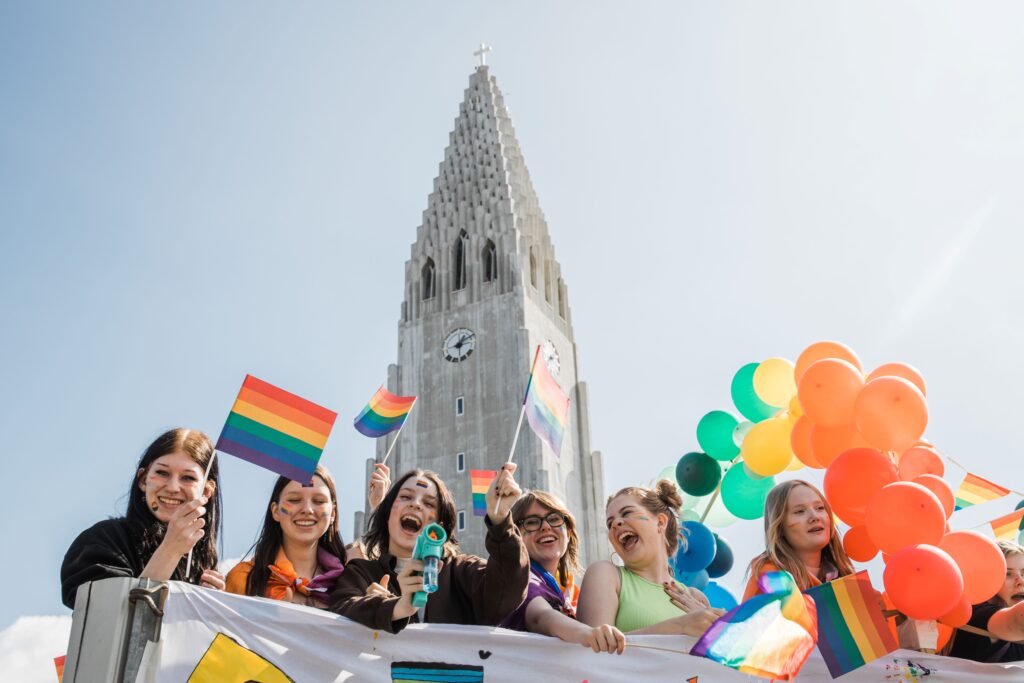
Samtökin ’78 (Suðurgata 3, 101 Reykjavík). The national queer association of Iceland, founded in, you guessed it, 1978, advocates and provides services for lesbian, gay, bisexual, asexual, pansexual, intersex and trans people. Though its primary focus is not visitors, the organization hosts regular events, meetings, lectures and art exhibitions at its offices.
Trans Ísland. An advocacy group formed in 2007, Trans Ísland hosts various meetings and events in different locations, some of which may be of interest to visitors. Members get discounts at various shops, cafés and restaurants. Their website also lists pools and gyms across the country with individual cubicles for changing, and which otherwise welcome trans and non-binary people.
Kíkí Queer Bar (Laugavegur 22, 101 Reykjavík). The rainbow-coloured exterior of Iceland’s dedicated LGBTQ+ bar/nightclub boldly declares its presence downtown. No matter what adventure you were up to earlier in the day, this is where everybody you want to meet eventually ends up. Intimate dance floor on the main floor, perfect-for-sealing-the-deal lounge upstairs. Home to karaoke nights, various drag shows and an occasional drag brunch. Downside: lots of stairs.
Gaukurinn (Tryggvagata 22, 101 Reykjavík). This long-standing pub and live-performance venue has more of an alt take than Kíkí: think rock and metal plus unisex washrooms. Always LGBTQ2S+ welcoming, but not always LGBTQ2S+ focused, so check the calendar to see what wets your whistle.
Pink Iceland. The leading wedding planning company in Iceland, and an organizer of group tours and bespoke travel itineraries, is, of course, gay owned and operated and a big supporter of LGBTQ2S+ events in Reykjavík, including Pride. (They were in charge of bringing in and hosting RuPaul’s Drag Race star Trinity the Tuck when she performed at Reykjavík Pride 2022.)
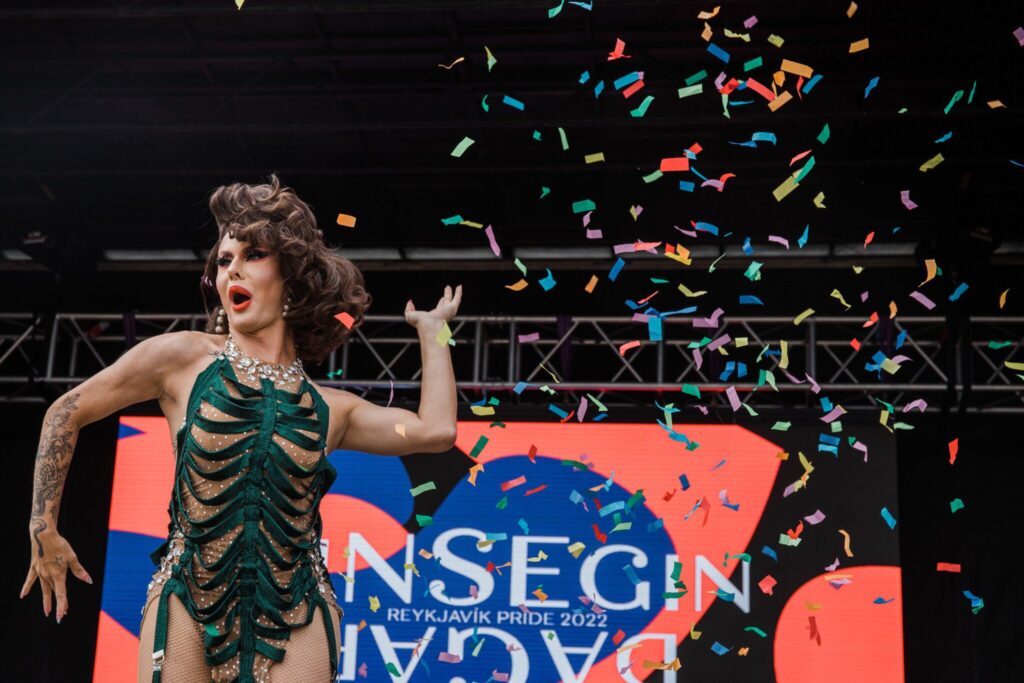
What to see and do
If you’re looking for Reykjavík’s social-media-famous rainbow street, there are actually two, Skólavörðustígur and Bankastræti, both charming pedestrian shopping thoroughfares. Together they comprise a pleasant stroll from the harbour area, uphill to the city’s number-one landmark, the modern-minimalist gothic Hallgrimskirkja, which can be seen from all over the peninsula. At Skólavörðustígur 22 you’ll find gay-owned Café Babalú, an affordable place for a bite while exploring the downtown.
Blue Lagoon (Norðurljósavegur 9, Grindavík). You’ve seen the photos, now take a dip in that milky aquamarine water. Few visitors come to Iceland, it seems, without doing so. Which is to say it’s a busy place. The changing rooms are divided into male and female, but there are private and public showering facilities available; non-binary people and others uncomfortable with gendered spaces can access special facilities upon request. Closer to the airport than the city, there are hourly shuttles for the 50-minute trip between Blue Lagoon and downtown.
Sky Lagoon (Vesturvör 44-48, Kópavogur). Opened in 2021, Sky Lagoon is smaller than Blue Lagoon, less busy, closer to the city centre and, frankly, a hipper and more sophisticated experience. The surrounding rocks make for a more intimate vibe—you could probably claim a nook in the rocks and not see anybody else for a while—and the views of Kársnes Harbour from the edge of the infinity pool are serenely inspiring. The ticket that includes public change rooms and showers is cheaper than the unisex private shower and change area, but guests who don’t identify as male or female, or who otherwise aren’t comfortable within the gendered changing rooms, can request to be upgraded to the unisex private zone at no extra cost.
Reykjavík Art Museum (Hafnarhús, Tryggvagata 17; Kjarvalsstaðir, Flókagata 24; Ásmundarsafn, Sigtún, Reykjavík). Of the three sites, Hafnarhús is the largest and is in the harbour area where most tourists will find themselves—you’re going to walk by it a few times when you’re here anyway, so why not go in? The site is often almost entirely given over to a single exhibition. The Kjarvalsstaðir site is entirely devoted to the works of modern artist Jóhannes S. Kjarval, while Ásmundarsafn is devoted to sculptor Ásmundur Sveinsson.
Höfuðstöðin (Rafstöðvarvegur 1a, 110 Reykjavík) is an arts and culture destination created by Iceland-born, New York-based artist Shoplifter/Hrafnhildur Arnardóttir and creative producer Lilja Baldursdóttir. Along with being a café and gift shop, Höfuðstöðin is the permanent home of Shoplifter’s installation “Chromo Sapiens.” The buzz of the 2019 Venice Biennale, the work is a series of cave-like interiors composed of vibrantly coloured synthetic hair (it’s more astonishing and less icky than it sounds). Björk bonus: Shoplifter, who has collaborated with brands like Moncler and Comme des Garçons, created the headpiece mask featured on the cover of 2004’s Medúlla album.
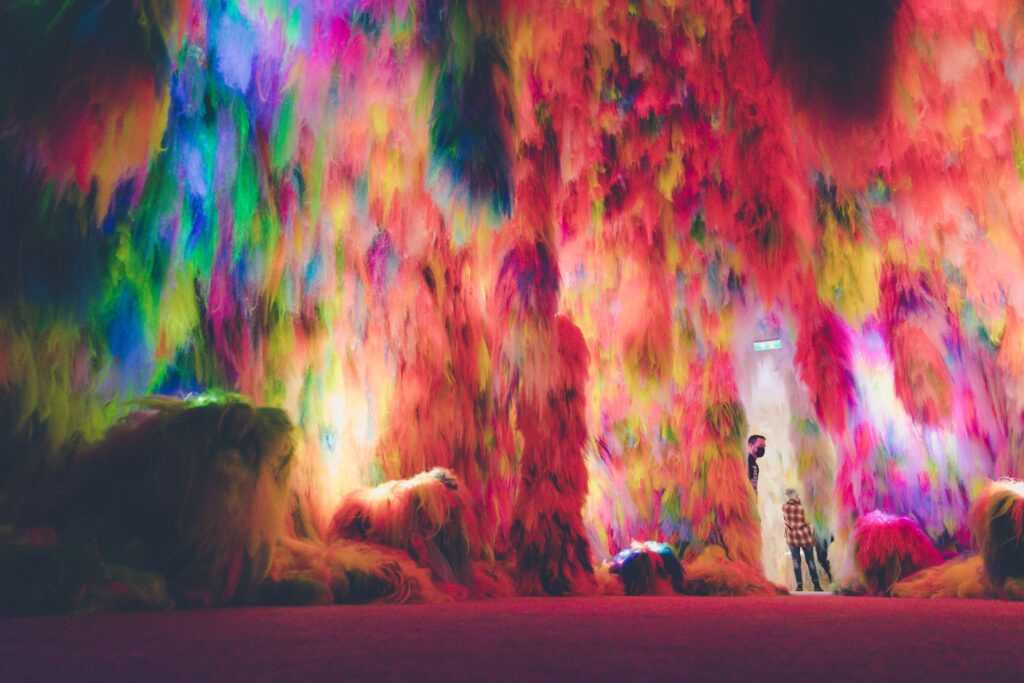
Boat tours (several operators around the harbour). With Iceland being such a sea-faring nation, it seems negligent to spend a visit to the country entirely on dry land. Visitors can watch whales, dolphins, porpoises and various birds, including puffins, not too far out into Faxaflói Bay. Between September and April, Northern Lights cruises are also popular. The big decision: go on a larger boat, where you can walk around and even socialize, or go on a smaller boat, sitting strapped in closer to the water. Elding Whale Watching, one of the city’s oldest tour operators, offers both.
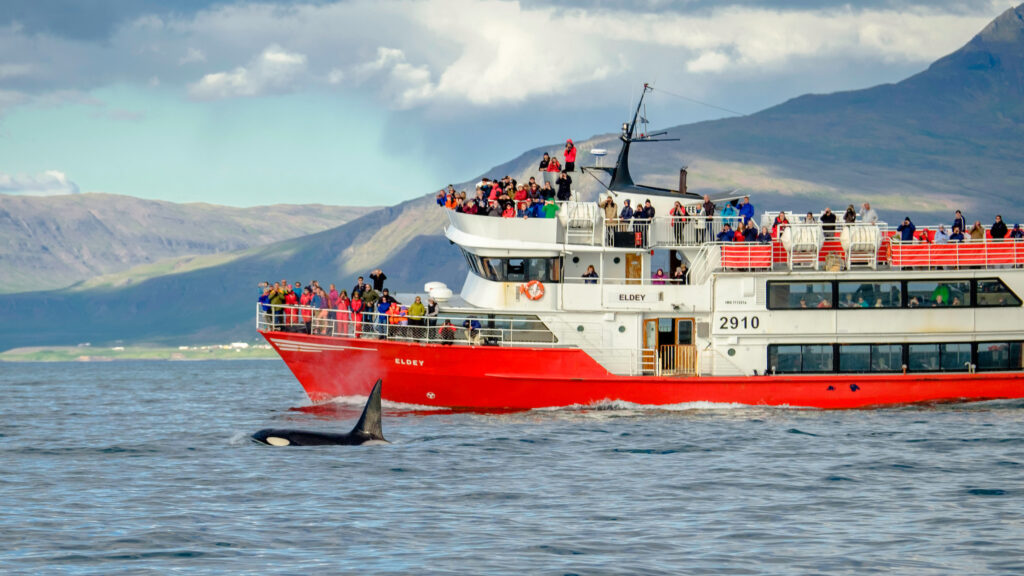
Where to stay
Reykjavík accommodations are not cheap, though it’s not Switzerland, either. Booking in the low-season months of December and January can provide some discounts, or there are accommodation-sharing services like Airbnb and gay-oriented misterb&b.
Opened in November 2021, The Reykjavík EDITION (Austurbakki 2, 101 Reykjavík)
has become a state-of-the-art hangout in the swanky new entertainment district between the city’s harbour and downtown. Right across from the spectacular Harpa Concert and Conference Center (opened in 2011, it lights up in rainbow colours for Pride), the EDITION oozes modern luxury with quirky furnishings and harbour views.
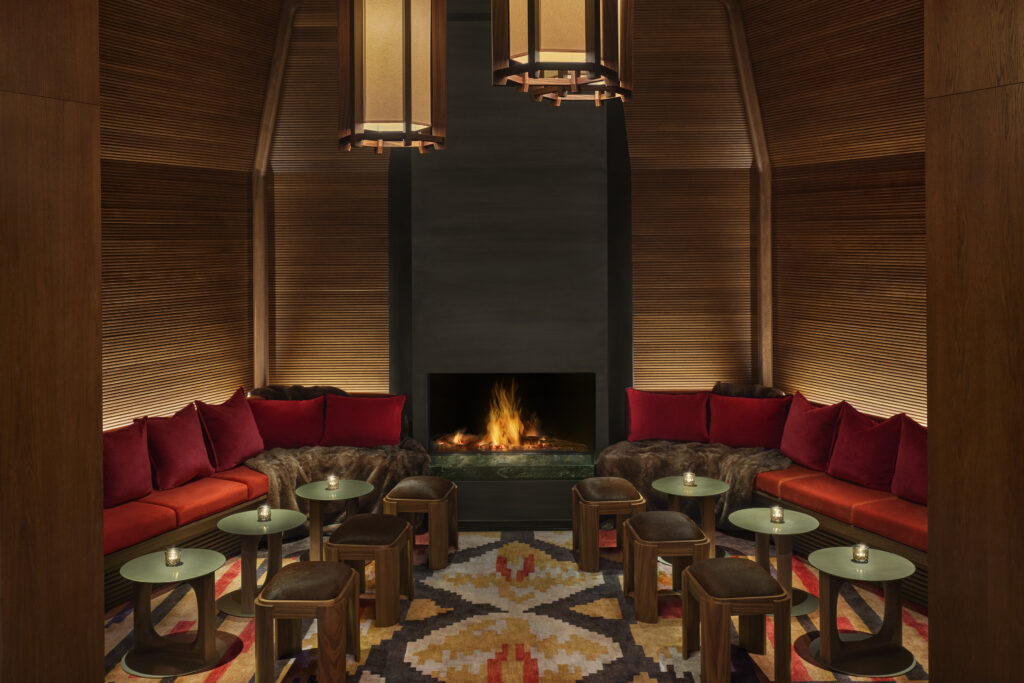
“101” is the Icelandic postal code for downtown that’s often used to characterize scenesters/people of leisure. Which explains the name of one of Reykjavík’s first boutique hotels, 101 hotel (Hverfisgata 10, 101 Reykjavík), with its minimalist rooms and art gallery.
If you’re not sleeping on one of the cruise ships that frequent Reykjavík harbour, why not sleep as close as possible to them in Icelandair Hotel Reykjavik Marina (Nauthólsvegur 52, 102 Reykjavík). The cozy colourfully-decorated rooms have a nautical vibe.
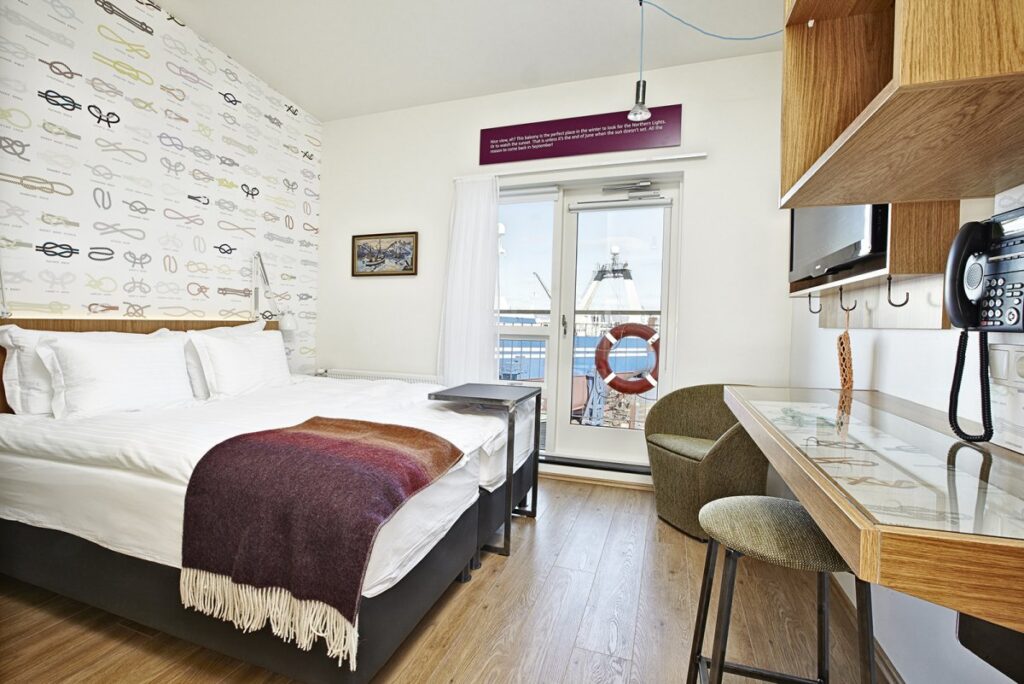
Well-rated Kvosin Downtown Hotel (Kirkjutorg 4, 101 Reykjavík) is located in a historic building across from Austurvöllur Park, the Reykjavík Cathedral and the Icelandic Parliament—so a good base for urban sight-seeing. The decor employs a grey colour palette to achieve a chic but homey effect. Known for its helpful staff.
Are you flying to Iceland solely for photo ops at Blue Lagoon and don’t want the hassle of staying in town? Ready to break the bank on some indulgences? The Retreat Hotel (Norðurljósavegur 11, 240 Grindavík) has 62 rooms, most looking out at the steam of the geothermal pools. Silica Hotel is Retreat’s somewhat less luxurious counterpart; only a few of its 35 rooms have lagoon views.
Where to eat
Seafood is king in this island nation. Game meat such as reindeer is also considered a treat. Yet the influence and importance of tourism mean that there are many international options, including vegetarian and vegan cuisine (but no McDonald’s). Visitors trying to stretch their dining budget have made Bæjarins Beztu Pylsur “The City’s Best Hot Dogs” (Tryggvagata 1, 101 Reykjavík) a phenomenon; the line in front of the kiosk can be very long and very chatty.
Fish Company (Vesturgata 2a, 101 Reykjavík). Artfully presented seafood (and reindeer, if that’s appealing) served in a former store that was built in the 19th century. Oh, and it’s under a bridge.
Food Cellar (Aðalstræti 2, 101 Reykjavík). Elegant and a smidge medieval? This brasserie is known for its grilled seafood and meat, as well as its cocktails.
Loving Hut Vegan World Peace (Adalstraeti 2, 101 Reykjavík). Though many restaurants in Iceland offer vegetarian and vegan choices, meat-free menus are hard to come by. Part of an international chain, Loving Hut has two locations in the capital, with this one close to the harbour area.
Sushi Social (Þingholtsstræti 5, 101 Reykjavík). In the dining room, a hip, young ready-to-mix crowd. Out of the kitchen, Japanese and South American fusion—tasty morsels usually made from local Icelandic seafood.
Check out our feature on what makes Iceland such an LGBTQ+-friendly country.
Editor’s note: The cost of the writer’s trip to Iceland was covered by Icelandair, The Reykjavík EDITION hotel and Visit Reykjavík. The sponsors of the trip did not direct or review coverage. The views expressed are the writer’s own.
